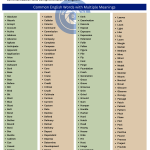Difference between Phrasal Verbs and Prepositional Verbs
The English language is a treasure trove of linguistic quirks, and one of its most fascinating features is the existence of phrasal verbs and prepositional verbs. These verb-particle combos can trip up learners, so let’s dive into their similarities and differences to clear the confusion!
What are Phrasal Verbs?
Imagine a regular verb getting supercharged by a tiny sidekick called a particle (preposition or adverb). That’s a phrasal verb! These dynamic duos have a figurative meaning that often differs from the literal meanings of the verb and particle.
Examples of Phrasal Verbs:
- Look up: Please look up the new word in the dictionary.
- Give in: Despite his initial resistance, he had to give in to the pressure.
Structure of Phrasal Verbs:
- Verb + Particle(s): The main verb combines with one or more particles.
- Particle Placement: The particles can come before or after the object, leading to separable and inseparable phrasal verbs.
Common Types of Phrasal Verbs:
- Transitive Phrasal Verbs: Take a direct object.
- Example: She put off the meeting.
- Intransitive Phrasal Verbs: Do not take a direct object.
- Example: The kids woke up early.
- Example: The kids woke up early.
What are Prepositional Verbs?
Prepositional verbs, on the other hand, are like a verb and a preposition holding hands. They work together to express a single, literal meaning. The preposition doesn’t add any figurative twist, it simply clarifies the verb’s action or relation.
Examples of Prepositional Verbs:
- Believe in: I believe in your abilities.
- Rely on: We can always rely on him.
Structure of Prepositional Verbs:
- Verb + Preposition: The main verb pairs with a specific preposition.
- Preposition Placement: The preposition consistently follows the verb and is not separated from it.
Common Types of Prepositional Verbs:
- Transitive Prepositional Verbs: Take a direct object.
- Example: She apologized for her mistake.
- Intransitive Prepositional Verbs: Do not take a direct object.
- Example: The cat jumped onto the table.
- Example: The cat jumped onto the table.
Key Differences:
- Structure:
- Phrasal Verbs: Verb + Particle(s)
- Prepositional Verbs: Verb + Preposition
- Particle vs. Preposition:
- Phrasal Verbs: Particles can function as prepositions or adverbs.
- Prepositional Verbs: The preposition is fixed and maintains its prepositional role.
- Separability:
- Phrasal Verbs: Can be separable or inseparable.
- Prepositional Verbs: Always inseparable.
Common Examples of Prepositional Verbs and Phrasal Verbs:
Prepositional Verbs:
- Look forward to: We look forward to meeting you at the event.
- Believe in: I believe in the power of positive thinking.
- Rely on: You can always rely on your friends in times of need.
- Apologize for: She apologized for the misunderstanding.
- Count on: Can I count on you to help me with this project?
- Listen to: I love to listen to music while working.
- Talk about: Let’s talk about our plans for the weekend.
- Think of: Can you think of a better solution to this problem?
- Consist of: The recipe consists of flour, sugar, and eggs.
- React to: How did she react to the surprising news?
- Agree on: to have the same opinion
- Apologize for: to express regret
- Arrive at: to reach a destination
- Believe in: to have faith in something
- Care for: to look after someone or something
- Depend on: to rely on someone or something
- Focus on: to give your attention to something
- Get over: to recover from something
- Look at: to direct your eyes towards something
- Pay for: to give money in exchange for something
- Think about: to consider something
- Wait for: to expect someone or something
Phrasal Verbs:
- Look up: If you don’t know the meaning, look it up in the dictionary.
- Give in: Despite his reluctance, he had to give in to their demands.
- Set up: Let’s set up a meeting to discuss the project.
- Break up: Unfortunately, they decided to break up after years of dating.
- Take off: The plane will take off in a few minutes.
- Turn on: Can you please turn on the lights in the room?
- Run out of: We ran out of milk, so I need to go to the store.
- Catch up: Let’s meet for coffee and catch up on each other’s lives.
- Bring up: It’s not easy to bring up sensitive topics in a conversation.
- Put off: They had to put off the meeting until next week.
- Bring up: to mention something
- Break down: to malfunction or become emotional
- Call off: to cancel an event
- Catch up: to meet someone after a period of time
- Cheer up: to become happier
- Come across: to find something by chance
- Figure out: to understand something
- Get through: to survive or complete something difficult
- Look forward to: to anticipate something with pleasure
- Pass out: to faint
- Put off: to postpone something
- Run out: to have no more of something
- Throw away: to discard something
- Turn down: to reject an offer
I hope this blog has been helpful! If you have any questions or want to share your favorite phrasal verbs and prepositional verbs, leave a comment below.





